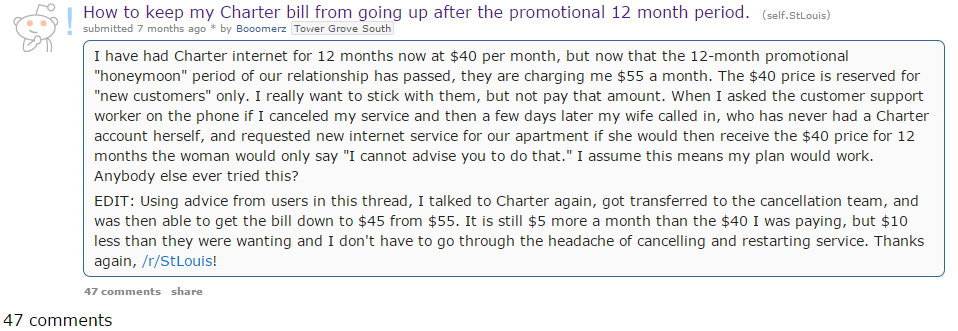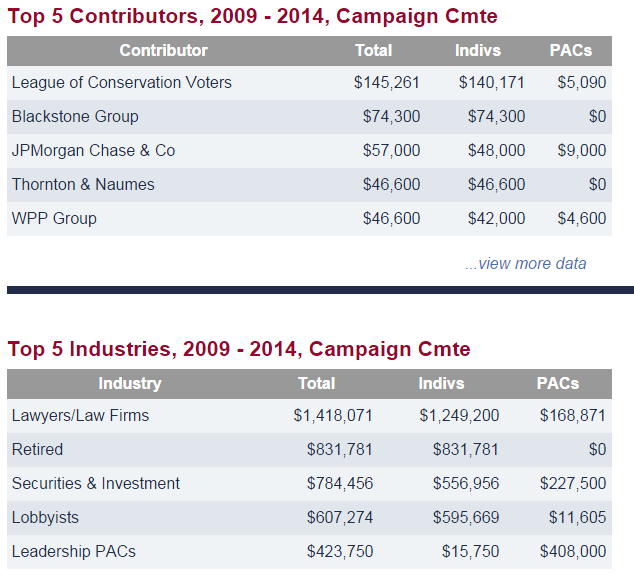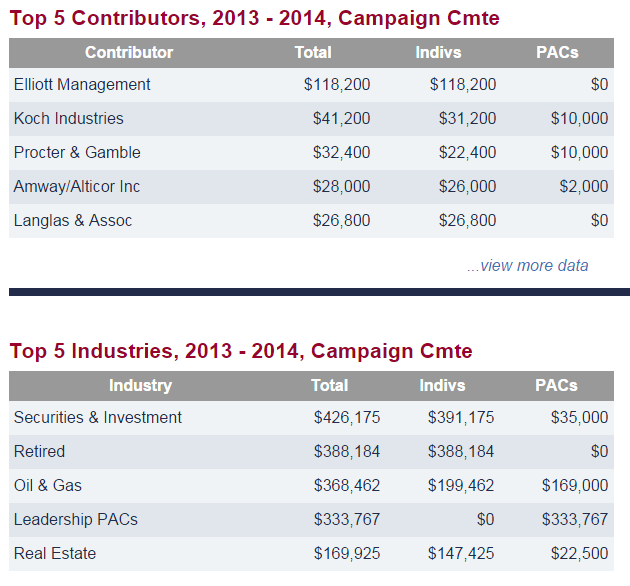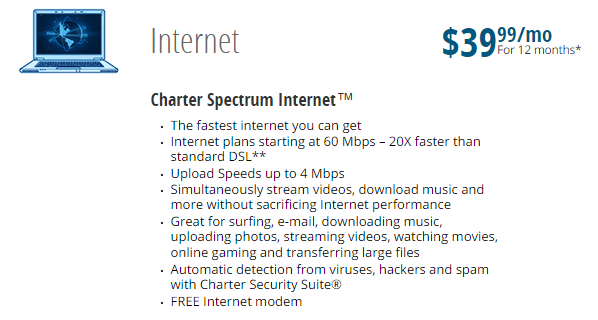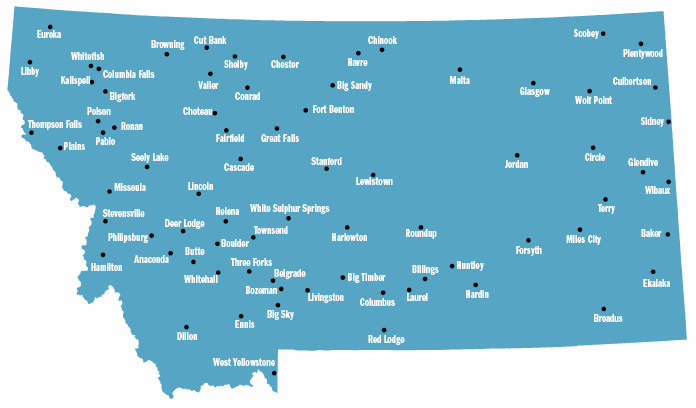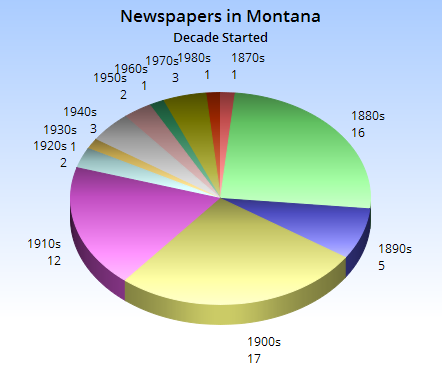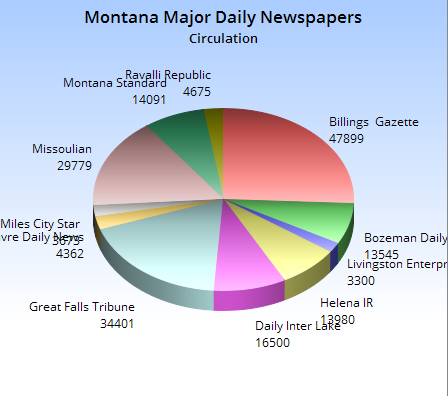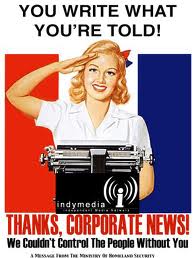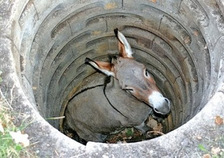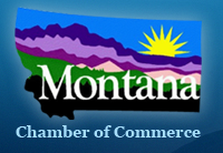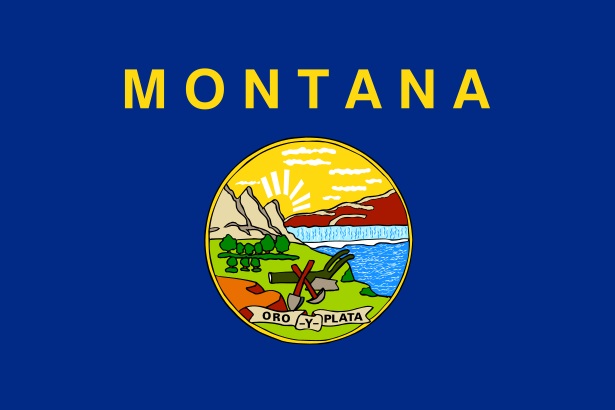
What’s more, my Charter bill just went up because I’ve been getting service for more than a year.
Wow...thanks.
I’m not happy with internet service in Montana, and I feel you aren’t either. In fact, I bet you’d do just about anything to really stick it to Charter and their crappy service.
One interesting post was on Reddit and was called How to keep my Charter bill from going up after the promotional 12 month period.
That’s the problem with this industry, and monopolies in general. When there’s no competition, there’s no reason to get excited or to even try anymore. Apathy and resentment sets in and most people in the enterprise just go through the motions for as long as they can before the CEO deploys the golden parachute and the Wall Street goons come in and chop the sucker up and sell it off. That’s just business.
Unfortunately for you and me in Montana, this sucks. We get terrible internet service, amazingly slow speeds, and no alternatives. Our only option is to get frustrated and go outside and yell obscenities…which I find is much cheaper and faster than waiting on hold for the Charter representative.
But wait a minute, what’s this 1.5 Mbps…what does that mean? Mbps stands for millions of bits per second and in Montana we just don’t get that many. The reason? Our broadband networks are very 20th-century.
“When it comes to data transmission in the United States,” the Great Falls Tribune’s Marc Stergionis said in July 2014, “Montana download speeds average a Model T rate of 15.61 Mbps compared with the nationwide family-sedan cruising at 24.87 and New Jersey's Corvette rate of 36.07.”
Gosh, if I choose Century Link for my Montana internet then I’ll be getting internet that’s about 15 times slower than Charter. Why would I do that…and perhaps a better question is, how does Century Link continue to operate as a going business concern? I mean, their service sucks, why would I buy it?
And why are we letting them get away with false advertising? It says 1.5 Mbps is “perfect for email, surfing the internet, social networking.”
Who are they trying to kid? Surfing the internet at 1.5 Mbps? Old people make love faster than my pages load at that speed!
According to data tests, Montana got less than 7.3 Mbps during the first part of 2013. In the rest of the country they were averaging 18.2 Mbps.
Why do business in Montana today, in this thing we call the 21st-century? It’s simple, you don’t. And you know what, this doesn’t bother Ryan Zinke, it doesn’t bother Steve Daines, and it doesn’t bother Jon Tester.
Why are we paying them $175,000 a year? What are they doing for us?
Internet is something we use each day, numerous times each day. And yet our elected representatives parade around before us and tell us they’re working for us. That’s a bald-faced lie. Our internet speed isn’t even half of what the rest of the country enjoys.
I wouldn’t ask Zinke or Daines or Tester to fix this – you’d be wasting your time. The internet service providers and other telecom giants give too much to their campaigns. These companies are more important than you and your family, it’s as simple as that.
Here’s the people that have given money to Senator Tester:
For now, just know that the Williams Companies spun off World Com and MCI in the mid-1990s and two of Blackstone’s leading men, Michael S. Chae and Michael Genereux specialize in telecoms. In other words, Blackstone profits from your slow Montana internet, and they pay Jon Tester to keep it that way.
Wait a minute, what does all this European telecom investing have to do with us here in Montana? Well, in Europe it’s profitable to have fast internet, but here in America it’s not. Here it’s profitable to keep the internet slow. And it’s just an added bonus that this also leads to less information being disseminated, fewer critical reports about politicians, and many more people inclined to sit in front of the TV instead of surfing the internet. That works great for keeping an electorate uninformed, something that works great for keeping apathetic and useless politicians in office, politicians that will gladly take dark money to work against the very people they were elected to represent.
Yes, America is broken, and nothing tells us that more than our slow internet speeds.
(What about Zinke, you ask? Ha, Zinke was a huge mistake and once we realize he’s not capable of bringing home money from Washington – as has been the Montana model for a good 70 years – we’ll shit-can his ass right back to California).
In the meantime, I still have to pay my $59.99 internet bill this month, for service that’s subpar to say the least. And gosh, because I’ve now been a loyal customer for more than 12 months, I’m rewarded with a higher bill than everyone else:
But let’s get back to that false advertising. That Charter speed of 60 Mbps isn’t quite accurate – I have to enter my exact address to figure out what my speed is. This is what I get after doing that:
Pumping throughput to 100 Mbps would take infrastructure work — more fiber-optic lines buried across the state and into neighborhoods, plus the addition of fiber-connection ports in the residential and business buildings.
Without a fiber connection, cable Internet providers can't scale up or down when traffic is high, so speed drops, she said. Fiber's much higher capacity vastly increases reliability.
When the Bitter Root Economic Development District started a $50,000 study of broadband capability in its three-county Western Montana region, said Marcy Allen, executive director, "we really set out to look at broadband as an essential piece of infrastructure like roads, water and sewer. What should government's role be," as well as what is the effect on the economic-development community, health care and education.
And he said Great Falls businesses and businesses that located here may see productivity suffer with slow connections and could just end up expanding elsewhere.
She said businesses scouting for locations may skip Montana as a potential site just from perception of a rural area, which is not helped by spotty cell-phone service in mountainous regions.
How can we compete globally in Montana and even in America? I saw this firsthand when I lived in China – internet was at least twice as fast and cost me about $200 for the year. Yes, the year.
That would sure lose those telecom giants money here in America, wouldn’t it? And that means Jon Tester and Steve Daines would have less money being donated to them, fewer bigshots telling them what to do.
We just can’t have that, you and I…the regular voter…now can we?
Ask yourself what these two men have done for you, ask it each time you get online.

